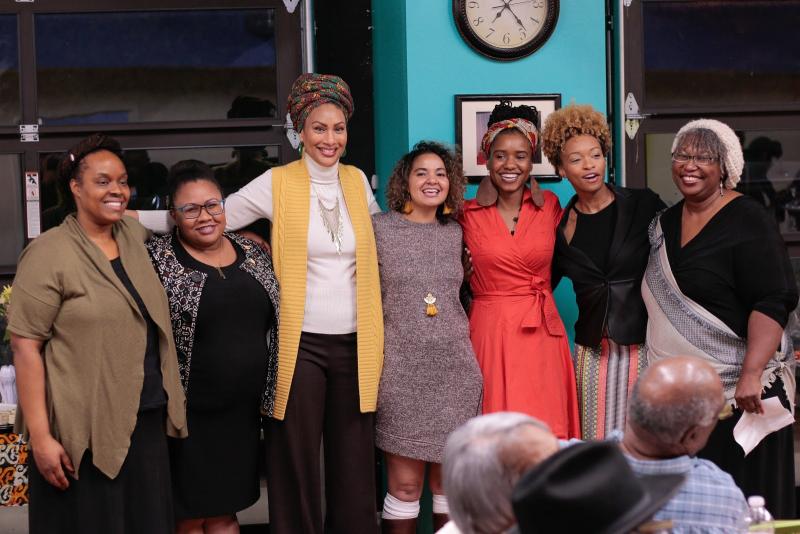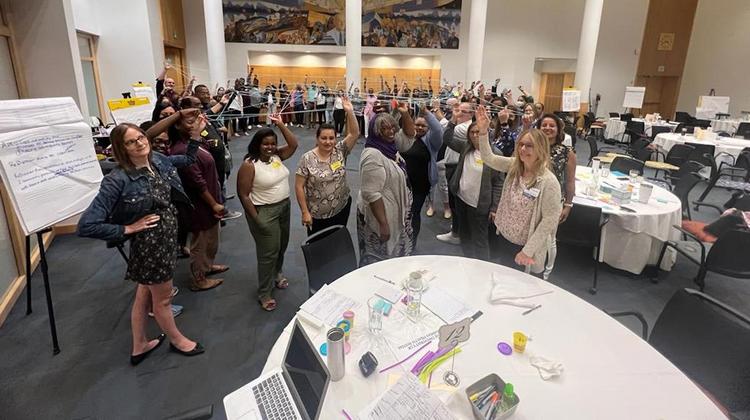Uzazi Village makes it its business to address health inequity.
The Kansas City nonprofit’s mission is to decrease maternal and infant health inequity in Black and brown communities.
In 2019, Uzazi Village started the Community Expert Review Board (CERB), a volunteer-based board. The board’s mission is to revolutionize Black maternal and infant health outcomes by amplifying the Black birth experience, fostering equitable research and ensuring culturally-congruent care.
The CERB is “truly seeking equitable support and equitable outcomes for all members of the KC community,” said Cecilia Saffold, a founding member of the board, and the chief operating officer of HealthTeamWorks.
Sharing knowledge with others
The CERB and Uzazi Village aren’t new to health equity work, and both organizations want to share what they know with Kansas City Health Equity Learning and Action Network (LAN) participants. The network is made up of more than 50 local organizations working for health equity and against discrimination in health care.
The CERB and Uzazi Village aren’t new to health equity work, and both organizations want to share what they know with Kansas City Health Equity Learning and Action Network (LAN) participants.
Hakima Payne, executive director of Uzazi Village, was involved with the LAN as the network was designed. Now that the network has formed, CERB members continue to participate in the network’s anti-racism work with a project that expands the board’s reach and gaining subscribers to sustain the board’s work.
Changing the narrative of Black maternal health
The maternal health outcomes are oftentimes different for Black and brown women. According to the Centers for Disease Control and Prevention, the maternal mortality rate for Black women was 2.9 times the rate for non-Hispanic white women in 2020.
As disturbing as reading the statistic is, hearing from Black Kansas City mothers was even more troubling, Saffold said. “We were hearing a lot of near-miss stories. Hospitals and health systems track morbidity and mortality. Mortality is, we die. Morbidity is that we have lasting, life-alternating implications as a result of something that happened during birth. There is a whole range of harm that is done that is falling under the radar. Those near misses that were near mortality or near morbidity are the best opportunities for improvement.”
That’s why the CERB’s mission is so important.
The CERB’s work
The Community Expert Review Board, who identify as Black Kansas City-area residents, work with researchers focused on maternal and infant health to see Black community issues through an anti-racism lens. The members go through training about the history of medical racism and the ways that research has been used and weaponized against Black people.
Researchers ask the board questions about their research, such as the effects of new medications, or the difference in communication styles between doulas and traditional medical providers. For each research project, members consider what the benefit is to the Black community and what harm could be done to the community.
The board has reviewed 17 research projects from 14 researchers since 2021 with more than half of those projects with local researchers. The board considers:
- Is the language in the project free of systemic bias?
- Is confirmation bias suspected?
- Will the results be used in preference to one group or another?
- Are assumptions being made?
- Is the research transparent?
Looking ahead
Saffold said while the board does important work, it’s a hefty commitment for volunteers, especially for those with small children at home and full-time jobs.
‘‘We would like the CERB to remain an initiative of Uzazi, but to have some full-time staff,” Saffold said. “We want to be able to talk to more researchers. We want to be able to impact more research.”
Board members would like to develop a subscription model so researchers can pay a fee to subscribe to services. This would include a process to finalize and formalize review research projects, so they ensure basic things are addressed in the research every single time.
Saffold hopes members of Kansas City’s business and research community step up and move past the assumption that working towards equality is enough. It’s time for action.
“It is time for Kansas City to step into our potential to be a city that truly can achieve and promote health equity,” she said. “There’s the need and the opportunity for a real robust distribution of our health care resources to support people who have been deprived of optimal health care.”
To contact the CERB, visit uzazivillage.org/cerb/.










